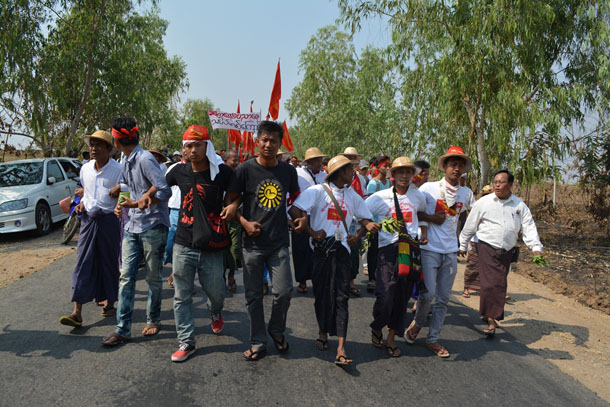Meaningful Dialogue on the National Education Law is the Burma Government’s Obligation
By Burma Partnership • February 9, 2015 In last week’s blog, Burma Partnership examined Burma’s burgeoning student movement, shedding light on the authorities’ repressive response to the protests and setting the issue in the wider context of Burma’s hollow political reforms. This week has seen no let-up, with the students continuing to dominate the headlines as support for them increases and the pressure steadily builds.
In last week’s blog, Burma Partnership examined Burma’s burgeoning student movement, shedding light on the authorities’ repressive response to the protests and setting the issue in the wider context of Burma’s hollow political reforms. This week has seen no let-up, with the students continuing to dominate the headlines as support for them increases and the pressure steadily builds.
Of most concern to the Burma Government must be the fact that the protests are multiplying and spreading: no longer merely confined to Rangoon, the movement has seen students hailing from regions ranging from the Irrawaddy Delta to Tavoy in the southern Tenasserim Region join their fellow brothers and sisters in solidarity. Another significant development is that the ranks of the protest movement are swelling with those, such as monks, political activists and ordinary local residents from passing towns and villages, who want to declare their support.
The Burma Government must naturally be fearful of any student movement, given the spectacular country-wide success of the historic 1988 student protests against the former military government of General Ne Win. And yet it does not seem to have learnt the lessons of history. The more it tries to repress students, the more the protests spread and the more support they garner. There is a tragicomic inevitability and inexorability about the way that the actions of the Burma Government appear doomed to bring about precisely the outcome that they are trying so desperately to avoid. The universal fear is that, as in 1988, the authorities will start shooting; but, as yet, they are only shooting themselves in the foot.
But do they have any other option? Of course: if the authorities were to engage in meaningful dialogue with the students, to negotiate in good faith the 11 priority demands which the Action Committee for Democratic Education proposed in its 24 January statement, and to respect the fundamental human rights of students and all citizens of Burma, then the protests would naturally abate without the need to quell them with violence, without the need to resort to age-old tactics that will – and have never – worked.
For instance, the authorities are attempting to blame political activists and alleged troublemakers for fomenting unrest. Only last Thursday, the Government Information Committee announced on state television that political organizations and “so-called students” were responsible for the ongoing protests and were attempting to destabilize the country, subsequently threatening to expose and take action against them. This is disingenuous, and a signature response of authoritarian governments the world over. Not only do such responses fool no one; they also insult the intelligence and autonomy of the students. It is high time that the Burma Government tackled the substance of the issue, engaged with the students, amended the National Education Law to reflect their concerns, and respected human rights. Otherwise, the tension will continue to mount – to the detriment of the country’s political health, economic development and moral standing.
A public announcement by the Ministry of Education that it would be amending the NEL at first glance looks like the first sign of compromise; however, it also included a stark warning that university examinations scheduled to start in late February would be held “without fail” – in other words, students must choose between their academic futures and exercising their fundamental right to freedom of assembly, their strongest point of leverage in defending their rights.
In fact, if the Burma Government were serious about a genuine transition to democracy – and one could be forgiven for thinking otherwise – it would realize that democracy is not a one-way street. Democratic governments govern on behalf of their people, and in response must accept its people’s criticisms and praise accordingly, depending on whether they are doing their jobs properly and representing people’s interests.
Furthermore, if the Burma Government were serious about courting votes before what is supposed to be Burma’s first free and fair election since 1990 later this year, it would realize that it cannot afford to alienate so many of Burma’s youth, the future of democracy in this country. Rather than panicking in the face of criticism and resorting to ever more authoritarian measures to quell protests, it has an obligation to listen to its people, and try to win them over the democratic way – before history repeats itself and blood is shed, inflicting another deep wound in the hearts of the people of Burma and pushing national reconciliation ever further away. Never has the Burma Government had a better opportunity to prove to the world that the leopard really has changed its spots.
Tags: Burma Partership, Ministry of Education, National Education LawThis post is in: Blog
Related PostsMore Clashes, More Talks, No Protection
56 Solidarity Groups Worldwide Call for an Immediate End to Offensives in Northern Burma/Myanmar and for the Provision of Unhindered Humanitarian Assistance to the IDPs
More Murders, Same Patterns as Burma Army Acts with Impunity
The Facts are Plain and Stated. It is Time to Act!









 All posts
All posts